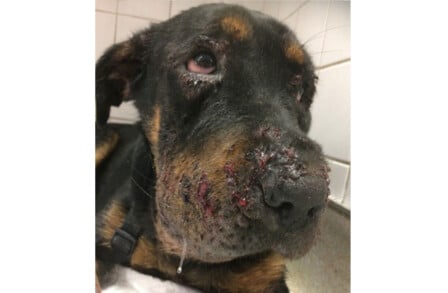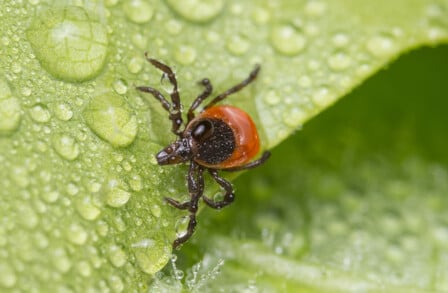
Webcasts
Join us on August 21 at 7 p.m. (EDT) as we explore antimicrobial resistance and the treatment of canine pyoderma in today’s reality. Antimicrobial resistance is increasingly recognized as a significant global threat to public health. Prudent use of antibiotics is an integral part of best veterinary practices. During this webcast, Dr. Vincent Defalque will focus on canine superficial pyoderma, the most prevalent infection in veterinary dermatology. The discussion will include evidence-based...
Sponsored by




Join us on July 30 at 7 p.m. (EDT) as we discuss the ins and outs of rabies and how to prevent this disease. It’s fair to say that veterinarians are among the health care providers who have an excellent understanding of the risks associated with rabies virus: all mammals (including humans) are susceptible; infected dogs and cats pose a high risk for transmission to humans; infection is virtually fatal; rabies vaccination of dogs and cats is an exceptionally safe and effective public health...
Sponsored by


Challenges related to pet-owner costs and other barriers to animal care have always been a part of veterinary practice. However, these day-to-day difficulties appear to be increasing, with growing attention to the ‘access to care’ veterinary crisis impacting our patients, clients, and veterinary care teams. One proposed solution to this problem is the deliberate incorporation of Spectrum of Care into practice (i.e., evidence-based care options along the continuum of acceptable care). During...
Sponsored by




`
See all
90 sec Scoop
When should veterinarians start discussing nutrition with new pet owners?
How can veterinarians ensure their puppy and kitten patients are on the right track with their diet?
Watch our latest quick, digestible video snippet prepared by and featuring board-certified veterinary nutritionist Dr. Allison Wara as she gives us the scoop on proper nutrition for puppies and kittens during their growth phases. She shares expert advice on growth diet formulation and explains how veterinarians can check...
Sponsored by


How can pets with specific medical conditions, such as lower urinary tract disease, gain from water supplementation?
What guidance can we offer pet owners to ensure their pets receive adequate hydration for optimal health and disease prevention?
Watch our latest quick, digestible video snippet prepared by and featuring board-certified veterinary nutritionist Dr. Allison Wara as she gives us the scoop on the crucial role of water consumption in maintaining health and managing diseases and...
Sponsored by


Are there measures that can be taken to prevent urinary tract health issues in pets?
Can nutrition play a crucial role in managing these issues?
Watch our latest quick, digestible video snippet prepared by and featuring board-certified veterinary nutritionist Dr. Allison Wara as she gives us the scoop on relative supersaturation tests conducted on some commercial diets as a reference tool to assess the risk of urinary crystal formation or prevent its recurrence.
Dr. Wara has also prepared a...
Sponsored by


Brain Matters
Niko, a 4-year-old, neutered male domestic long hair presents to your clinic for a second opinion. For the past few months, Niko has been severely pruritic around his face and neck. The owner has been keeping Niko in an Elizabethan collar due to his high level of discomfort. According to the owner, his previous veterinarian has “tried everything” including corticosteroids, antibiotics and a therapeutic shampoo, but nothing has worked. The owner claims that Niko had some diagnostics done, and...
Sponsored by


You are currently working with an 8-year-old, neutered male domestic short hair with a history of intermittent diarrhea and vomiting. Serum chemistry and complete blood count values were all within normal limits. Total T4, free T4 and urinalysis results also did not show any significant abnormalities. You then decided to submit serum cobalamin and folate tests which show a low cobalamin concentration.
Sponsored by


Case studies
Roxy is a 14-month-old intact female Rottweiler presented to you for progressive skin lesions. She was initially presented to another veterinarian four months ago with progressive non-pruritic localized hair loss targeting the periocular area.
Follow the evolution of her case to find out what is causing her lesions.
Sponsored by


Peanut is a 6-month-old, female Boston terrier presenting to your clinic for pruritus. Though there have been no changes in the household or environment, her family noticed that her condition has worsened over the last four weeks.
Follow the evolution of her case to find out what is causing her itchiness.
Sponsored by


Marmalade is a 9-year-old, neutered male DSH presenting for his yearly wellness exam. The owner has noticed an increase in drinking and larger clumps in the litterbox, and he is not jumping up on things the way he used to.
Follow the evolution of his case to find out what is causing his symptoms.
Sponsored by


Kitty Insider
GET THE LATEST SCOOP ON THE TOP 5 MYTHS ABOUT CATS AND PARASITES
While indoor cats have less exposure to parasites compared to outdoor cats, they are not entirely immune. Pet owners must take preventive measures and be aware of potential risks to keep their beloved indoor felines healthy and parasite-free.
In this month's KITTY INSIDER, Dr. Kelly St. Denis debunks the top five myths about cats and parasites, highlighting why even indoor felines require vigilant protection.
Sponsored by




GET THE LATEST SCOOP ON FELINE NUTRITION
In veterinary clinics, three primary vital assessments are routinely performed during patient visits: temperature, pulse, and respiration. However, it's important to also consider pain and nutrition when evaluating the health and well-being of feline patients.
In this month's KITTY INSIDER, Dr. Kelly St. Denis emphasizes the importance of discussing nutrition at every veterinary visit. She offers practical advice on ways to incorporate nutrition into...
Sponsored by




GET THE LATEST SCOOP ON RABIES
Spring is the season that draws everyone outdoors to enjoy the fresh air and sunshine. However, it's also a time when wildlife and neighbourhood cats become more active, increasing the risk of infectious diseases.
In this month's KITTY INSIDER, Dr. Kelly St. Denis discusses rabies prevention and vaccination, providing invaluable insights into safeguarding our feline friends. She also talks about essential preventive measures to ensure the well-being of our...
Sponsored by




NutriQUIZ
A complete diet provides all the essential nutrients, but could still be unbalanced; if the ratios between the essential nutrients are ideal, then the diet can be considered complete and balanced. A classic example is the ratio between the minerals calcium and phosphorus (Ca:P) which needs to be at least 1:1, but not higher than 2:1 for adult dogs and cats. Micronutrients are defined as those required in the diet in mg/kg or parts per million (ppm). Depending on the ingredients used or the...
Sponsored by


Dietary fibre has several beneficial effects on the digestive system and on general health. For instance, it promotes regular intestinal transit, helps reduce the risk of diarrhea and constipation, and regulates blood sugar and cholesterol levels.
Dietary fibre is a part of the plant that corresponds more specifically to the plant cell wall. It is characterized by its resistance to enzymatic digestion and absorption in the small intestine, but is completely or partially fermented by the...
Sponsored by


There are published nutritional profiles (or standards) for gestation and lactation, growth and adult maintenance for dogs and cats. However, there are no specific nutritional profiles to define how diets should be designed for senior or geriatric pets, or for working dogs holding a wide range of jobs. Therefore, nutritional needs should be assessed on a patient-by-patient basis and they should take into consideration all of the animal, dietary and feeding management factors for the current...
Sponsored by


RVTips
How can RVTs show more compassion and take things less personally to fully enjoy their profession?
What is the difference between compassion and sympathy?
In this video from our series Top tips for RVTs, Jolene Watson, an emotions-centered coach, professional speaker, and proud RVT, focuses on strategies to avoid empathy fatigue. She shares her perspective on emotional navigation and regulation, suggesting that expanding one's emotional vocabulary and understanding can help manage stress. She...
Sponsored by


Empowering technicians in OA treatment !This webcast is presented as part of our series on canine osteoarthritis addressing pathogenesis, disease awareness, canine and owner quality of life, and osteoarthritis management, including new developments.In this webcast, Dr. Georgina Beaumont and Evie Tummon, RVT, provide comprehensive up-to-date education on various aspects of canine osteoarthritis (OA) from a new perspective, the RVT's perspective, and the important role RVTs/AHT play in...
Sponsored by


How can RVTs help create a stress-free environment for pets at the veterinary clinic? What steps can be implemented to ensure the comfort of our furry friends during their veterinary visits?
In this video from our series Top tips for RVTs, Jessica Benoit, a registered veterinary technologist and veterinary technician specialist in behaviour, shares her top five tips for providing a calm and comfortable experience to patients at the veterinary clinic. She emphasizes the importance of ensuring...
Sponsored by


Scientific Snapshots
Watch this video as Dr. Tony Yu addresses key considerations surrounding ear cytology in veterinary dermatology. He emphasizes the importance of timing cytology tests and outlines various treatment options. Dr. Yu highlights the role of ear cytology in follow-up appointments for monitoring and adjusting treatment plans. Additionally, he offers practical advice for supporting pet owners with financial constraints, offering alternative strategies to ensure comprehensive care for pets.
Sponsored by


Watch this video as Dr. Tony Yu discusses the primary challenges veterinarian face when treating cases of otitis externa in pets. He explores underlying causes, including allergies, that contribute to recurrent otitis externa. His insight aims to alleviate frustration for both veterinarians and pet owners, fostering a better understanding and management of the condition.
Sponsored by


The most common suture pattern utilized in canine gingiva post dental extraction is the simple interrupted pattern (SI). Although SI sutures take longer to complete than some other patterns, it has been thought to be the least likely suture pattern to fail. The simple continuous pattern (SC) is faster to complete and is an acceptable pattern in closing canine and feline abdominal incisions. Barbed sutures (SF) that are “knotless” are another option that is becoming more popular in some human...
Sponsored by


Vetspresso
Veterinary professionals often regard the "gold standard of care" as the best and only way to practise veterinary medicine. However, human medicine is increasingly adopting a "spectrum of care" approach, which tailors treatments to individual needs and circumstances. By factoring in variables such as cost, client expectations, and the specific requirements of each pet, this approach could potentially elevate veterinary practice, offering optimal, personalized care for all patients.
Perk up...
Sponsored by




Dietary changes are often the first step in diagnosing and treating dogs with chronic enteropathy, aiming to provide balanced nutrition, avoid allergens, and resolve symptoms. While many dogs improve with dietary changes alone, it is essential to closely monitor the dog's response and adjust the diet as needed for sustained symptom relief. Ultimately, collaboration between veterinarians and pet owners is crucial for proper management and improved quality of life for affected dogs.
Perk up with...
Sponsored by




Ixodes scapularis, known for transmitting diseases like Lyme disease through pathogens such as Borrelia burgdorferi, has expanded its geographic range in recent decades, posing new health risks in these areas. This expansion, partly due to warming temperatures, is also influenced by other factors, including the fact that adult female ticks infected with B. burgdorferi could have better survival rates during winter compared to uninfected ticks.
Perk up with your monthly shot of Vetspresso! In...
Sponsored by








 60:00 min
60:00 min


























